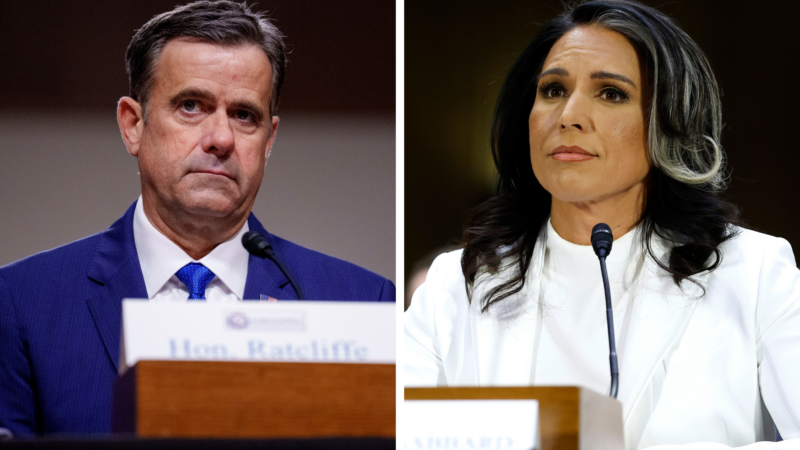Intelligence leaders will testify before Congress, fresh off the group chat fiasco
As fallout from the Signal scandal continues, the leaders of several intelligence agencies — some of whom were part of the group chat that inadvertently shared war plans with a journalist — are set to testify before Congress this week.
The country’s top two intelligence officials, CIA Director John Ratcliffe and Director of National Intelligence Tulsi Gabbard, are among the five officials expected to appear as witnesses in a pair of hearings in the intelligence committees of the Senate on Tuesday and the House on Wednesday.
The others are FBI Director Kash Patel, Defense Intelligence Agency Director Jeffrey Kruse and Timothy Haugh, head of the National Security Agency and Central Security Service.
The previously scheduled hearings, to be livestreamed on YouTube, were planned to focus on the latest edition of an annual assessment of worldwide threats to U.S. national security, mainly from China, Russia and Iran. But they are also likely to address a security concern that originated closer to home.
The hearings begin just a day after Jeffrey Goldberg, the editor-in-chief of The Atlantic, revealed that a top Trump administration official had added him to a group chat — on the encrypted messaging app Signal — about the U.S.’ highly sensitive plans to bomb Houthi targets in Yemen earlier this month.
Gabbard and Ratcliffe were among the 18 individuals who participated in the text chain, a group that Goldberg said also included Vice President JD Vance, Defense Secretary Pete Hegseth and national security adviser Michael Waltz.
The National Security Council confirmed the authenticity of the message thread on Monday, saying it was “reviewing how an inadvertent number was added to the chain.” President Trump denied any knowledge of the incident when asked on Monday, and Hegseth told reporters that “nobody was texting war plans.”
Lawmakers on both sides of the aisle have criticized the security breach, with several Democrats calling for the participating officials to be investigated and disciplined. This week’s hearings give Congress a chance to press intelligence leaders directly.
Lawmakers are demanding accountability
The incident raises questions about the Trump administration’s handling of sensitive information.
Goldberg told NPR that he was not vetted before being added to the chat, where he was exposed to “operational military information” with details including targets, weapons and attack sequencing.
Such conversations are supposed to take place in what’s known as a Sensitive Compartmented Information Facility (SCIF), a secure room that top-ranking officials have in their offices and homes.
National security experts have voiced alarm that they instead used a publicly available messaging app. In fact, a 2023 Department of Defense memo specifically cited Signal as an example of an “unmanaged” messaging app that is not authorized to transmit non-public DOD information.
Democrats in Congress had roundly criticized many of Trump’s security and intelligence picks for their perceived lack of experience during the nomination process — and are now calling for further investigation.
House Minority Leader Hakeem Jeffries and Senate Minority Leader Chuck Schumer have publicly called for an investigation into what they respectively called “this unacceptable and irresponsible national security breach” and the “damage it created.”
“Everyone on the public WAR PLANS group text should immediately lose their security clearances and be fired,” tweeted California Rep. Eric Swalwell, a member of the House Homeland Security Committee. “Their idiocy just put a giant target on America. We are not safe.”
Sen. Roger Wicker, R-Miss., who chairs the Senate Armed Services Committee, told reporters, “We’re very concerned about it, and we’ll be looking into it on a bipartisan basis.”
While Republican lawmakers have largely downplayed the incident, several have been openly critical.
Rep. Don Bacon, R.-Neb., told CNN he thinks there should be accountability for what he called a “security violation.”
“Everyone should know better than putting top secret war plans on an unclassified phone,” he said.
Rep. Mike Lawler, R-N.Y., tweeted that classified information should “not be transmitted on unsecured channels — and certainly not to those without security clearances, including reporters.”
“Safeguards must be put in place to ensure this never happens again,” he added.
America’s top figure skaters dazzled St. Louis. I left with a new love for the sport.
The U.S. Figure Skating National Championships brought the who's who of the sport to St. Louis. St. Louis Public Radio Visuals Editor Brian Munoz left a new fan of the Olympic sport.
DHS restricts congressional visits to ICE facilities in Minneapolis with new policy
A memo from Homeland Security Secretary Kristi Noem, obtained by NPR, instructs her staff that visits should be requested at least seven days in advance.
Historic upset in English soccer’s FA Cup as Macclesfield beat holders Crystal Palace
The result marks the first time in 117 years that a side from outside the major national leagues has eliminated the reigning FA Cup holders.
Sunday Puzzle: Pet theory
NPR's Sacha Pfeiffer plays the puzzle with KAMW listener Daniel Abramson of Albuquerque, N.M, and Weekend Edition Puzzlemaster Will Shortz.
Venezuela’s exiles in Chile caught between hope and uncertainty
Initial joy among Venezuela's diaspora in Chile has given way to caution, as questions grow over what Maduro's capture means for the country — and for those who fled it.
Inside a Gaza medical clinic at risk of shutting down after an Israeli ban
A recent Israeli decision to bar Doctors Without Borders and other aid groups means international staff and aid can no longer enter Gaza or the West Bank. Local staff must rely on dwindling supplies and no international expertise.








